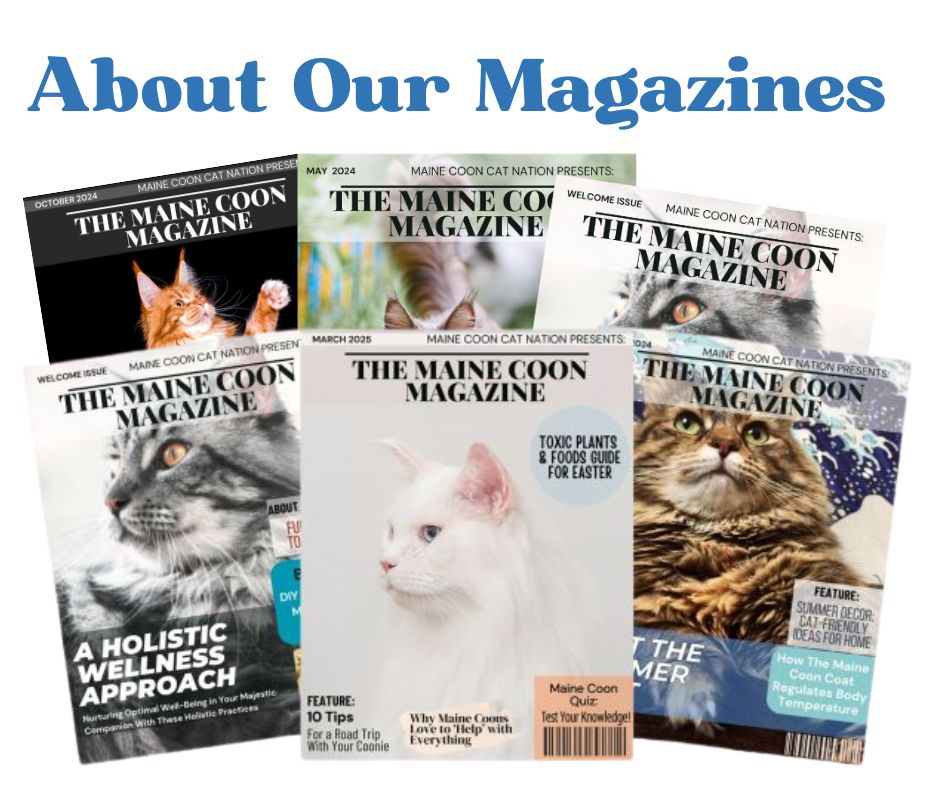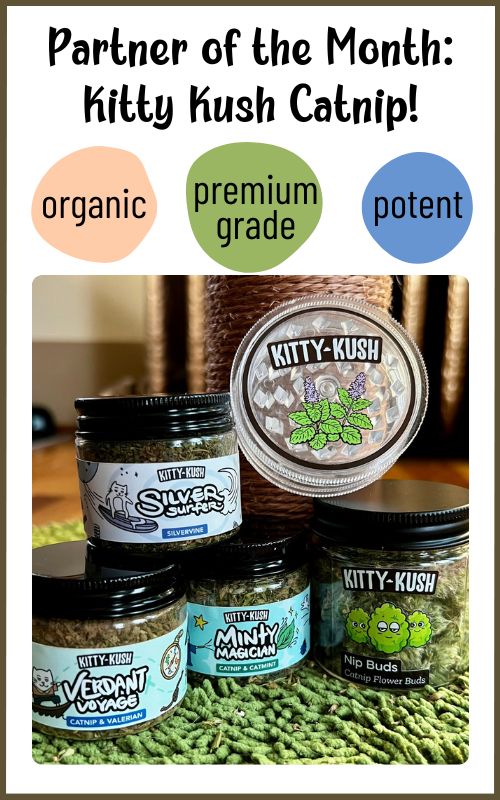- Home
- Maine Coon Cat Breed
- Is a Maine Coon Cat Part Raccoon?
Is a Maine Coon Cat Part Raccoon?
Can They be Related?
Is a Maine Coon cat part raccoon? This is a question many Maine Coon owners are asked by curious friends or family members at some point!
Growing up in the state of Maine, I always thought of our state cat as being big, furry, mysterious, and native to the land - sort of like the local wildlife, but domesticated.
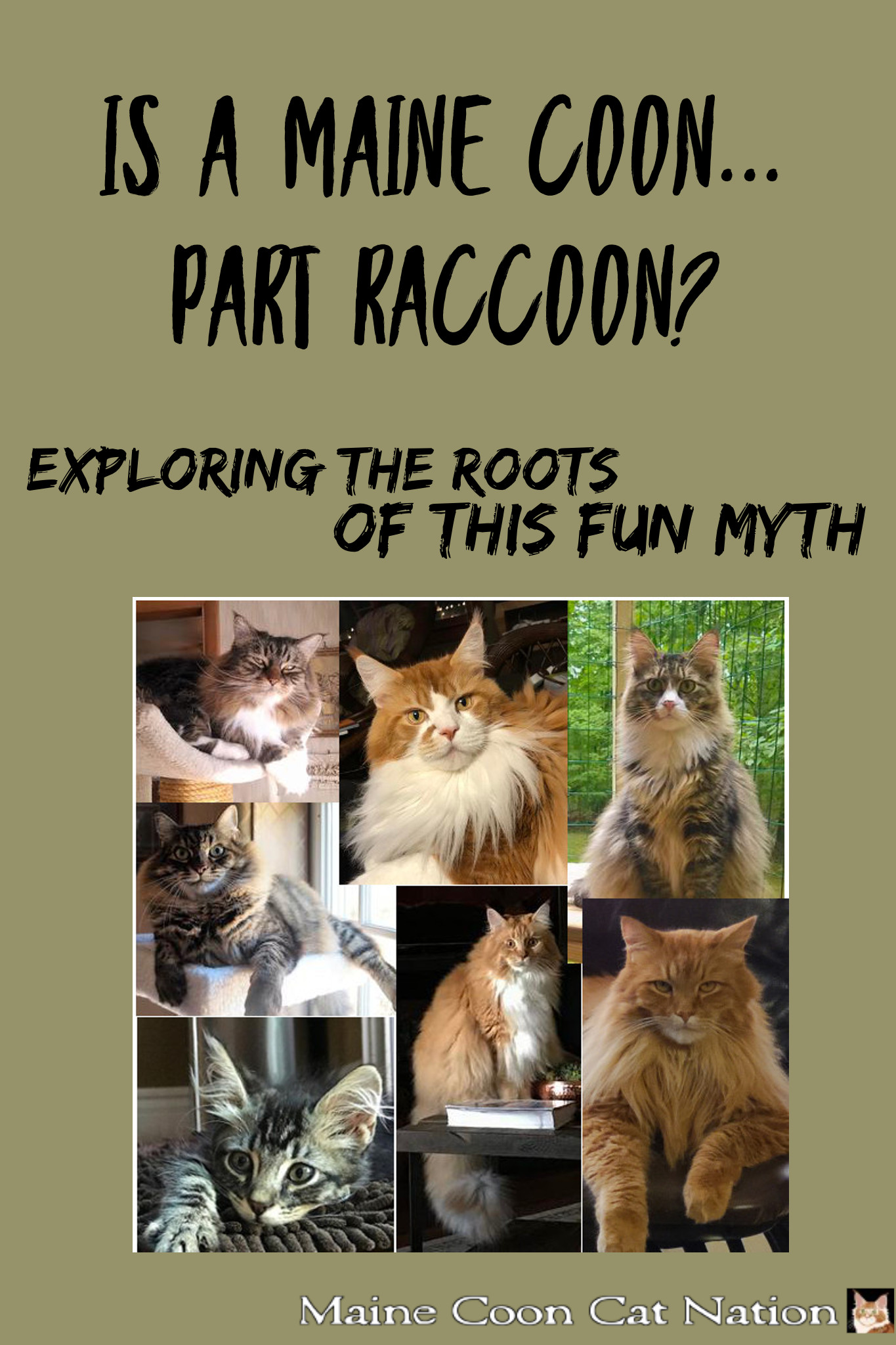 100% feline!
100% feline!I think many people, especially those who are unfamiliar with animal genetics or with this this alluring, intriguing breed, have a similar idea - that they are somehow linked to nature, wildlife, and perhaps raccoons.
After all they have "coon" in the name. And sometimes animal hybrids do happen in nature. Most of us are familiar with the liger, mule and zorse.
But did you know that a camel and a llama can create a cama? There is also such a thing as a narluga, which is half narwhal and half beluga, as well as examples of some fish, birds and insect hybrids. [1]
With all the mystery around the origins of this rough-and-tumble looking breed, it's not surprising when folks sometimes ask if a Maine Coon is part raccoon - a cat raccoon mix.
After all, raccoons are of a similar size, fluffy and striped, friendly, curious and inquisitive - like Coonies!
Today we'll explore the origins of this fascinating cat breed. It's so easy to fall in love with these gentle giants!
Let's talk about:
- The myth that a Maine Coon is part raccoon and whether it's true
- The mysterious origins of the breed that birthed this cat and raccoon mix theory
- The inside scoop on these beloved felines!
Maine Coon cats and raccoons share some similarities in appearance and behavior, which leads to the notion that they have common characteristics. Some superficial similarities include:
- Fur Coloration: Both can have a similar grayish-brown fur coloration, especially in certain lighting conditions.
- Raccoon-like Tail: This cat breed is known for having long, bushy tails. Tabby Coonies can have tails with markings that resemble the fluffy tails of raccoons.
- Similar Size: As one of the largest domesticated cat breeds, these kitties can be quite substantial in size. Although an average cat isn't usually as big as a raccoon, this breed can be.
- Ear Tufts: Some Coonies have ear tufts or lynx-like ear tips, which can be reminiscent of the pointed ears of raccoons.
- Sociable Behavior: Coonies are known for their friendly and sociable nature, which might be similar to the curious and sometimes bold behavior of raccoons.
- Nocturnal Activity: Both raccoons and felines can be more active during the nighttime, which is a common trait among many nocturnal animals.
The Maine Coon breed, known as the "gentle giant" of the cat world, is known for its large size, long hair, and fluffy tail.
With such fascinating raccoon-like physical characteristics, it's understandable to question if Maine Coons are half raccoon, or a cat raccoon mix. In fact, there's a pretty popular myth around this!
This fun legend suggests that Marie Antoinette, the French queen, had plans to escape to the United States during the French revolution.
Supposedly, she sent her beloved Turkish Angora cats ahead of her. Unfortunately, she couldn't make it, but her cats did.
And these royal felines intermingled with the local wildlife, which of course, included wild coons.

A cat and raccoon mix, or hybrid, sounds pretty exciting, doesn't it? However, before we go any further, it's essential to point out that this notion of a cat-raccoon hybrid is scientifically impossible:
Are Maine Coons mixed with raccoon?
Raccoons and cats have a significant genetic barrier that prevents them from producing offspring.
The mechanism of reproductive isolation ensures that the fertilization of eggs only occurs within members of the same species. [2]
So, while their stripes may suggest otherwise, Maine Coons are not, indeed, part raccoon.
Can cats and raccoons mate?
Another common folk tale is that the breed started as a result of domestic female cats mating with wild animals – tame male raccoons!
Physically, these two different species of animals can "do the deed" - but the word mate in this case means "create offspring."
As thrilling as it sounds, unfortunately, procreation between cats and raccoons are simply not genetically possible. So despite having similar names, they're not related and there's no such thing as a cat raccoon mix.
Maine Coon cats and raccoons are two distinct species with several notable differences in their characteristics and behavior:
Species:
- Maine Coon cats are a domesticated breed of feline known for their friendly and sociable nature. They belong to the Felis catus species.
- Raccoons are wild animals and belong to the Procyon lotor species. They are not domesticated and are typically found in the wild.
Size:
- Maine Coon cats are large domestic cat breeds, with males weighing between 13-18 pounds (5.9-8.2 kg) and females weighing around 8-12 pounds (3.6-5.4 kg).
- Raccoons are larger than Maine Coon cats, with adults typically ranging from 15 to 28 pounds (6.8-12.7 kg) or more.
Physical Features:
- Maine Coon cats have a typical feline appearance with retractable claws, a slender body, pointed ears with tufts, and a long, bushy tail.
- Raccoons have distinct features, including a mask-like pattern on their faces, sharp non-retractable claws, a robust body, and a distinctive ringed tail.
Behavior:
- Maine Coon cats are known for their domesticated and friendly behavior. They are typically kept as pets and are sociable with humans.
- Raccoons are wild animals and exhibit behavior suitable for survival in the wild. They are generally wary of humans and can be aggressive when cornered.
Diet:
- Maine Coon cats are obligate carnivores, primarily consuming meat-based diets. They are domesticated and typically fed commercial cat food.
- Raccoons are omnivores and have a varied diet that includes fruits, vegetables, insects, small mammals, and even human food when available.
Habitat:
- Maine Coon cats are kept as pets and are usually found in homes. They do not have a specific wild habitat.
- Raccoons are native to North and Central America and are typically found in a variety of habitats, including forests, urban areas, and wetlands.
Origins of this Feline Breed:
Originating in North America, these large cats have a history as unique and varied as their looks. Early Maine Coons, believed to be descended from Norwegian Forest cats brought over on European ships by Norse explorers, had to withstand harsh winters.
Their long-haired, shaggy coat and the tufts in their ears helped protect them from the cold, replicating the look of a wild raccoon.
Then why are they called "Coon?"
This is probably due to another origin theory which links the name "Maine Coon" to Captain Charles Coon, an English sailor.
The story goes that whenever Coon’s ship docked, his long-haired cats would mate with local feral cats, resulting in kittens bearing a distinct resemblance to today's Coonies!
"What Two Breeds Make a Maine Coon?"
"What Two Breeds Make a Maine Coon?"
The Maine Coon cat breed is a standalone breed - a breed in and of itself. It's not a crossbreed, a hybrid or a "designer pet."
You can't mix two different breeds to make a Maine Coon. These beauties may have come about many generations ago by Norwegian Forest cats or other longhaired cats breeding with local short-haired domestic cats.
No one really knows! What we do know for sure is that today they are purebred felines. Preservation breeders work passionately to breed, register and show these gorgeous felines.
The Official State Cat of Maine:
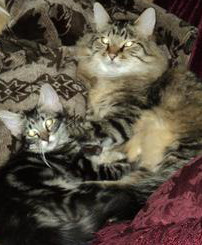 Sherlock and Watson have the "wild look" here!
Sherlock and Watson have the "wild look" here!The lifestyle of the original Maine Coon cats was very different from the comfy domestic life they enjoy today!
Early Maine Coons were working cats who helped control rodent populations in the "pine tree state". These 'working cat' roots contributed to their large size and powerful hunting instincts. Although, most Coonie owners I know would say "what hunting instincts?!"
These friendly beasts, also the largest domesticated cat breed, possess certain traits like their large size, large bushy tails, and robust muscles that make them look like wild animals.
However, their personality is anything but wild! They are famously gentle, making excellent pets for cat lovers or first-time cat owners like you!
Aside from their large size and raccoon-like tail, these beautiful kitties possess many distinctive features that make them stand out.
They have tufted ears, high cheekbones, a strong jaw, and their eyes are wide-set. Coonies also have a dense water-resistant fur, perfect for enduring harsh winters.
Their colors range from the most common shades like brown, black, and white, to the more unique colors like cream, silver, and blue.
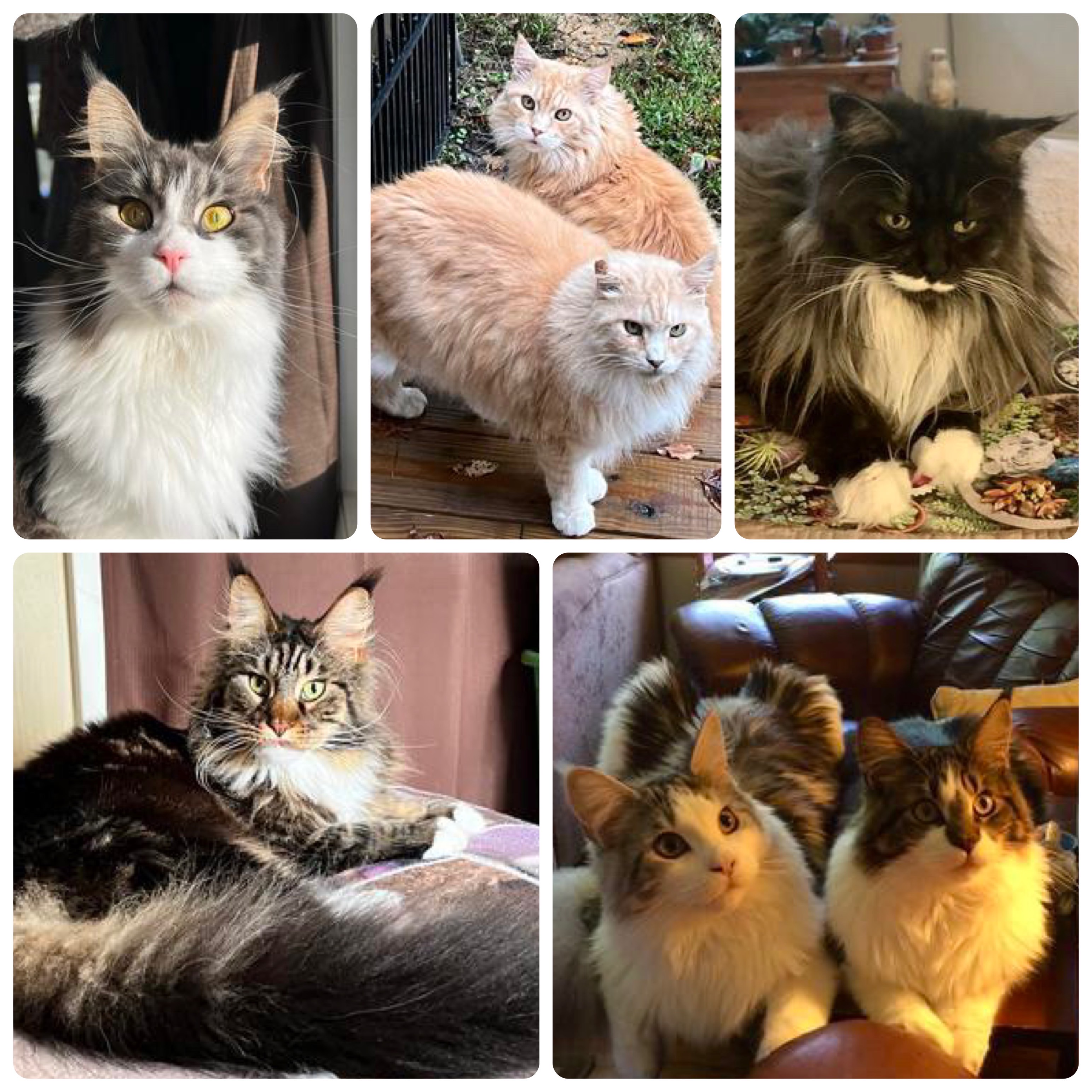
This breed is known for their friendly and playful temperament. They adore human company and even get along well with other pets!
This breed is often referred to as the 'dogs of the cat world' due to their interactive and social behavior. They are genuinely gentle giants, proving popular with families and individual owners alike.
With all their exotic features and an energetic personality, Coonies continue to charm people across the globe, consistently placing among the most popular cat breeds in the United States.
Some other breeds also give off serious raccoon vibes! While there's no such thing as a true cat and raccoon mix (despite some wild myths), a few breeds naturally sport that masked bandit aesthetic.
Take the Norwegian Forest variety - big, rugged, and decked out in a thick, waterproof coat. With their long, bushy tails and tufted ears, they’ve got a bit of that woodland trickster charm.
Then there’s the Siberian, another fluffy wonder with a luxurious coat built for cold climates. Their round faces and expressive eyes only add to the resemblance.
Even the Bengal, with its striking markings, can sometimes channel raccoon energy. Those rosettes and high-energy antics make them little prowlers of the night.
And for an unexpected twist? The Pixie-Bob. With their wild look, bobbed tails, and sometimes even polydactyl paws, they’re like mini raccoons in disguise!
While these breeds might look the part, they’re all just regular, lovable felines. But if you're drawn to that mischievous, fluffy-tailed aesthetic, these are the ones to check out!
"Is a Maine Coon cat part raccoon?" - Recap
So, in conclusion, the concept of a cat and raccoon mix might seem possible, considering their size and physical resemblance.
But, in truth, cat-raccoon hybrids are purely a legend. These captivating creatures are all feline, and purely remarkable ones at that!
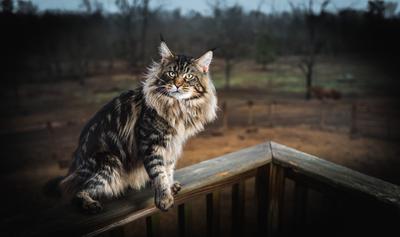 Metatroneyes Lee Browning
Metatroneyes Lee BrowningAs you step into your journey as a cat parent, always remember that these gentle and loving creatures deserve as much care and affection as they give.
These fun and quirky kitties, with their playful antics and quirky characteristics, are sure to fill your home with joy and amusement.
So, get ready to dive into the world of large cats, fluff, and inquisitiveness. The liveliness, added with the royal stature of this breed is bound to give you a companionship worth cherishing for a lifetime.
Do not let the size of these majestic felines intimidate you; underneath the wild look lies a heart filled with love and affection for their human! With their striking physical traits and warm and loving nature, the Maine Coon breed is truly desirable and an excellent choice for your first pet.
So, while the idea of a cat and raccoon mix breed is fun to imagine, it remains just a myth. If you're looking for a cat that has raccoon-like traits, the Maine Coon breed is a fantastic choice, with its big bushy tail, playful nature, and striking markings.
Wonder no more, "Is a Maine Coon cat part raccoon?" They are marvelously 100% feline pets, eager to bring warmth, joy, and companionship to your home. Ponder the possibility, and you may soon find yourself smitten by this iconic North American breed.
Above all, remember, every Coonie is unique and lovable in its own way - definitely a royal addition to your home. So, ready to introduce a furry friend into your life?
Top of Is a Maine Coon Part Raccoon?
« Back to Breed History and Info
Sources:
[1] Bittel, J. (2022, November 1). Ligers, zorses, and pizzlies: How animal hybrids happen. Animals. https://www.nationalgeographic.com/animals/article/ligers-zorses-pizzlies-how-animal-hybrids-happen
[2] Westram, A. M., Stankowski, S., Surendranadh, P., & Barton, N. (2022). What is reproductive isolation? Journal of Evolutionary Biology, 35(9), 1143–1164. https://doi.org/10.1111/jeb.14005
Recent Articles
-
Today's Features
Apr 16, 25 09:54 PM
Today we have two classic Memory Lane pages to share!
Murphy & Candy Cane: Double the Maine Coon Charm - This adorable Maine Coon duo from our 2011 Photo Albums - Murphy and Candy Cane - brought doubl… -
Memory Lane Month Begins!
Apr 15, 25 10:22 PM
We're thrilled to start our "Memory Lane Month" event by visiting some cherished moments from our community! We're in the process of restoring meaningful community stories like this one, to preserve t… -
Will a Maine Coon Protect Its Owner From Danger or an Intruder?
Apr 09, 25 10:41 PM
Plenty of people are curious: Will a Maine Coon protect its owner if something happens? Let’s talk about what this means, and what kind of protector a Coonie is.
